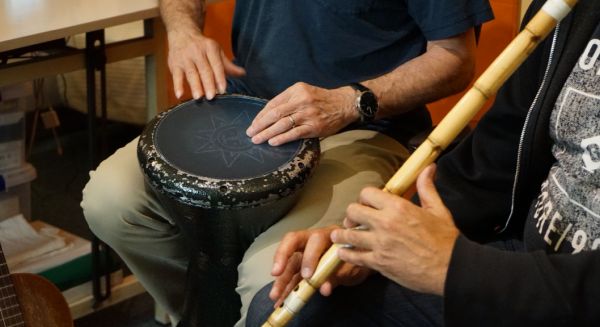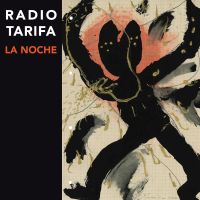


Radio Tarifa
La Noche
Buda Musique
Review by Chris Nickson

|
"Me Preguntas" (excerpt) |
 In 1993, Radio Tarifa created a huge stir with their stunning debut album, Rumba Argelina. Evolving from an early music group in Spain, they cast their net wider, becoming an imaginary radio station where flamenco played alongside Andalusian music, Arabic – and early music. That blending seems normal now, but over 30 years ago it was quite revolutionary. Originally the brainchild of multi-instrumentalists Fain Sanchez Dueñas and Vincent Molino, it really hit lift-off when combined with the glorious raw vocals of Benjamin Escoriza. The album was a global success and pushed them on to a broader stage, where they remained until the band broke up in 2006. Six years later, Escoriza’s death seemed to be the end of any new music.
In 1993, Radio Tarifa created a huge stir with their stunning debut album, Rumba Argelina. Evolving from an early music group in Spain, they cast their net wider, becoming an imaginary radio station where flamenco played alongside Andalusian music, Arabic – and early music. That blending seems normal now, but over 30 years ago it was quite revolutionary. Originally the brainchild of multi-instrumentalists Fain Sanchez Dueñas and Vincent Molino, it really hit lift-off when combined with the glorious raw vocals of Benjamin Escoriza. The album was a global success and pushed them on to a broader stage, where they remained until the band broke up in 2006. Six years later, Escoriza’s death seemed to be the end of any new music.

|
"Tarantos" (excerpt) |
La Noche finds Molino and Dueñas working together with a wide range of vocalists – including a big surprise – a recording of Escoriza himself on the opening title cut. Placing it at the beginning of the disc offers both continuity and a very apt memorial to a huge talent. Musically, the track is a loving encapsulation of their ethos, intensely melodic, with the charmingly woozy keyboards adding a delicious air of mystery in a very inventive, inviting arrangement. But Radio Tarifa aren’t living in the past here. With a range of different singers on the rest of the material, they show that while the idea of a stylistic musical mix has caught up with them, they have the invention to keep ahead of the pack. "Me Preguntas" parades through Andalusia, and that leads into the ache of "Tarantos," where Javier Castrillón's voice carries the weight and the pain of the song.

|
"Quel Sol Che Raggia" (excerpt) |
“Quel Sol Che Raggia” takes the band back to their early music roots on a piece by 14th century composer Francesco Landini. It’s framed in a spare arrangement, with a crystal wordless vocal by Blanca Paloma, a sign of Radio Tarifa’s all-encompassing approach that it never feels out of place.

|
"Samai Sintigo" (excerpt) |
It sits perfectly well next to “Samai Sintigo,” where Molino’s fluent playing on the ney flute, alongside the guembri of vocalist Juan Miguel Cabral, crosses the Mediterranean to perfectly conjure up North Africa, just as the traditional Japanese piece “Sakura” makes perfect, eclectic sense here.
That mix of the traditional and classical with a few originals has always been the way with this band and it still proves to be a winning formula. With La Noche, Dueñas and Molino remember Escoriza and also exorcise his ghost to show that, even after a break of nearly 20 years, they still have plenty to say – and it’s all worth hearing.
Further reading:
Afro Celt Sound System - OVA
Nostalgique Kongo: Rumbas Lingala, Swahili, Kikongo, & Douala 1950-1960
Justin Adams and Mauro Durante - Sweet Release